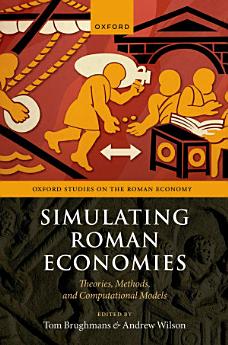Simulating Roman Economies: Theories, Methods, and Computational Models
Tom Brughmans · Andrew Wilson
Aug 2022 · Oxford University Press
Ebook
368
Pages
family_home
Eligible
info
reportRatings and reviews aren’t verified Learn More
About this ebook
The use of formal modelling and computational simulation in studies of the Roman economy has become more common over the last decade. But detailed critical evaluations of this innovative approach are still missing and much needed. What kinds of insights about the Roman economy can it lead to that could not have been obtained through more established approaches, and how do simulation methods constructively enhance research processes in Roman Studies? This edited volume addresses this need through critical discussion and convincing examples. It presents the Roman economy as a highly complex system, traditionally studied through critical examinations of material and textual sources, and understood through a wealth of diverging theories. A key contribution of simulation lies in its ability to formally represent diverse theories of Roman economic phenomena, and test them against empirical evidence. Critical simulation studies rely on collaboration across Roman data, theory, and method specialisms, and can constructively enhance multivocality of theoretical debates of the Roman economy. This potential is illustrated, avoiding computational and mathematical language, through simulation studies of a wealth of Roman economic phenomena: from maritime trade and terrestrial transport infrastructures, through the economic impacts of the Antonine Plague and demography, to local cult economies and grain trade. Through these examples and discussions, this volume aims to provide the common ground, guidance, and inspiration needed to make simulation methods part of the tools of the trade in Roman Studies, and to allow them to make constructive contributions to our understanding of the Roman economy.
About the author
Tom Brughmans is an associate professor at Aarhus University's Centre for Urban Network Evolutions (UrbNet) and Classical Archaeology. His research interests include the study of Roman economic and urban phenomena, past social networks, and visual signalling systems. He performs much of his work by applying computational methods such as network science, agent-based simulation, and geographical information systems. His research projects MERCURY and SIMREC developed educational resources and case studies to make simulation studies of the Roman economy more common (Leverhulme Early Career Fellowship and Marie-Curie Individual Fellowship). His ongoing project MINERVA aims to develop a highly detailed network model of the Roman road system, and to perform simulation experiments to explore the centuries-long distribution patterns revealed by Roman tableware and amphora data. Andrew Wilson is Professor of the Archaeology of the Roman Empire and Fellow of All Souls College, Oxford. His research focuses on the Roman economy, ancient technology, urbanism, and settlement. He has excavated in Italy, Libya, Tunisia, Syria, Cyprus, and Turkey. He is co-director (with Alan Bowman) of the Oxford Roman Economy Project (OxREP), and (with Chris Howgego) of the OxREP-Ashmolean Coin Hoards of the Roman Empire project; and he is also Principal Investigator of the Endangered Archaeology in the Middle East and North Africa project (EAMENA).
Rate this ebook
Tell us what you think.
Reading information
Smartphones and tablets
Install the Google Play Books app for Android and iPad/iPhone. It syncs automatically with your account and allows you to read online or offline wherever you are.
Laptops and computers
You can listen to audiobooks purchased on Google Play using your computer's web browser.
eReaders and other devices
To read on e-ink devices like Kobo eReaders, you'll need to download a file and transfer it to your device. Follow the detailed Help Center instructions to transfer the files to supported eReaders.






